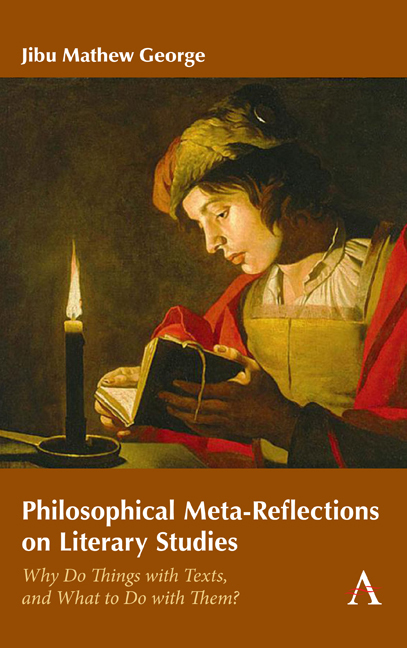 Philosophical Meta-Reflections on Literary Studies
Philosophical Meta-Reflections on Literary Studies Book contents
- Frontmatter
- Dedication
- Content
- Acknowledgements
- Introduction
- 1 The Why and Wherefore of Academic Disciplines: The Humanities and the Human World Process
- 2 If Literature were to Disappear from the Spectrum of Disciplines …
- 3 Beyond for and Against: Tendencies of Contemporary Criticism
- 4 The Aesthetic and the Political
- References
- Index
4 - The Aesthetic and the Political
Published online by Cambridge University Press: 11 December 2019
- Frontmatter
- Dedication
- Content
- Acknowledgements
- Introduction
- 1 The Why and Wherefore of Academic Disciplines: The Humanities and the Human World Process
- 2 If Literature were to Disappear from the Spectrum of Disciplines …
- 3 Beyond for and Against: Tendencies of Contemporary Criticism
- 4 The Aesthetic and the Political
- References
- Index
Summary
The Scandal Called the Aesthetic
It appears too late in the day to ask the question ‘What is “good” literature?’ It might seem even too late to argue for or against an essentialist definition of literature or literary value. Contemporary literary criticism is weighed in favour of the idea that it is contexts, institutions and discourses which decide the literariness of any piece of speech or writing. We have successfully extended the use of the term ‘literature’ on the basis of media, genre and sociological criteria to include oral literature, pulp fiction and the writings/ cultural practices of many formerly marginalized groups, respectively. It is a critical commonplace that an unconscious system of values lies behind our evaluations of literature, and that this varies from culture to culture and from person to person. For a Marxist critic, this system of values is related to class structure and the intellectual hegemony of the dominant class. For a postcolonial critic, the texts which were considered prestigious and were prescribed for academic study were so, because they were ideological tools of, and in turn received impetus from, the politico-cultural project of imperialism. Similarly, feminists challenge a male-centred canon. Indeed such endeavours have helped to set right the lopsidedness of literary history as well as contemporary priorities.
Apropos the subjective side, indeed the apprehension of literary value is partly a matter of the subject-object symmetry. If this is the case, value – I refuse to categorize it as exclusively ‘aesthetic’ because there are more aspects to value than pure aesthetic – is located neither exclusively in the reader nor in the text but at the precise point of encounter between them. But the subject is not an autonomous Cartesian one but is constituted in the collective, historically specific discourses. As such, the system of values consists of culturally acquired elements and maybe entangled in the networks of power and ideology. Further, literary values are pluralistic; there are many kinds of excellence.
Is there something called aesthetic quality? Can it be decided at all? If the answer is in the affirmative, how does one decide the quality of a literary work? Can the political be demarcated from the aesthetic?
- Type
- Chapter
- Information
- Philosophical Meta-Reflections on Literary StudiesWhy Do Things with Texts, and What to Do with Them?, pp. 93 - 110Publisher: Anthem PressPrint publication year: 2019
